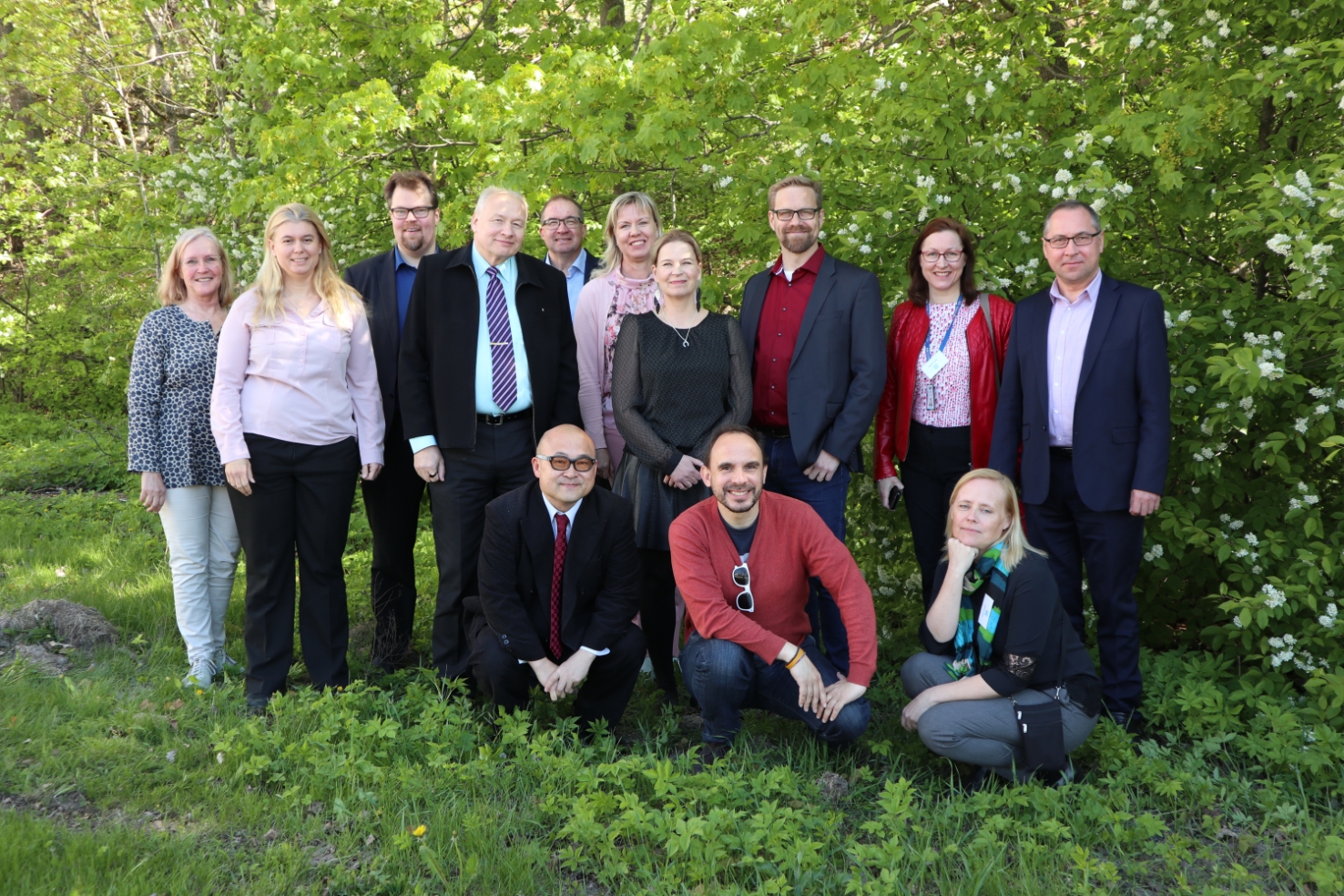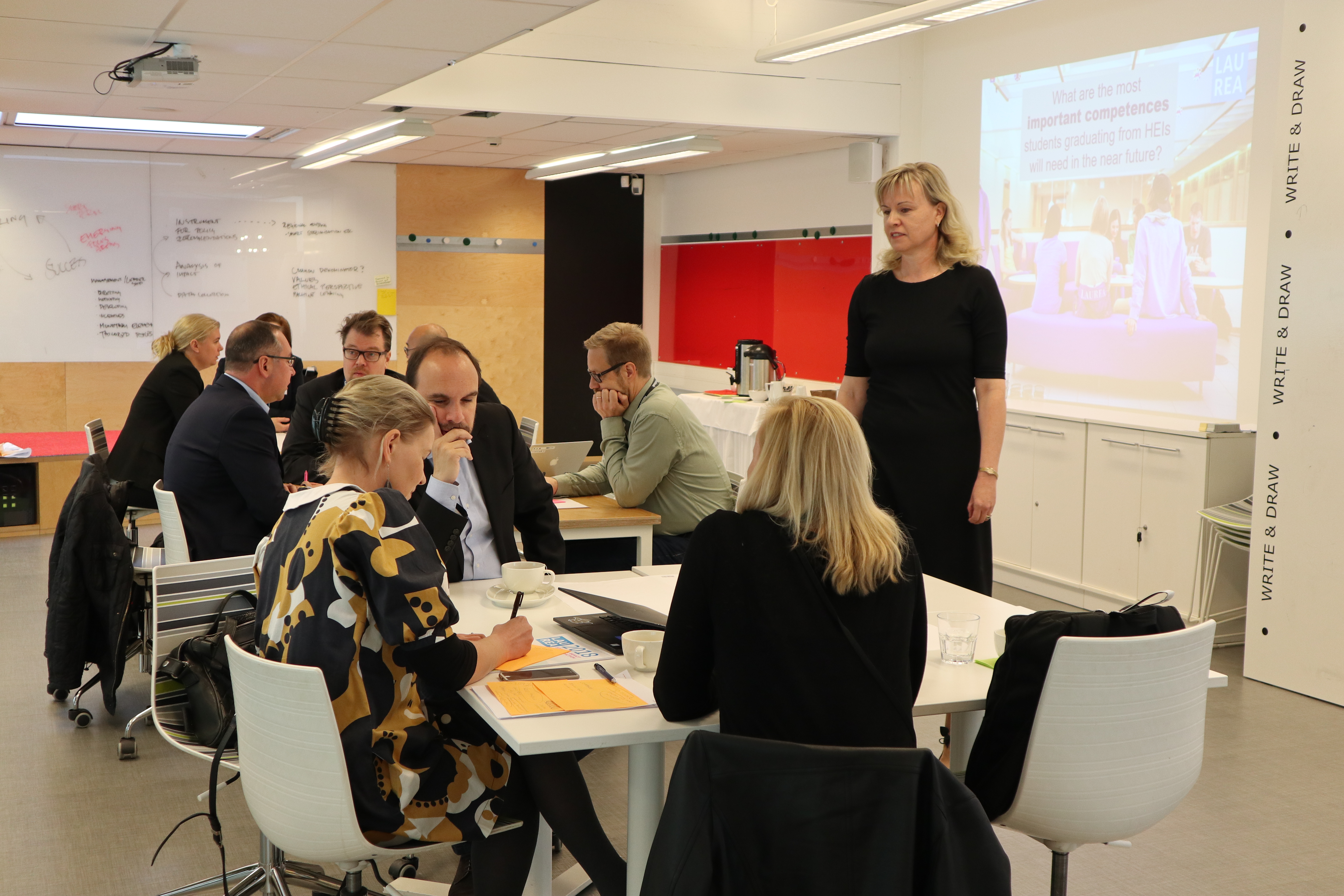Finding a balance between RDI and teaching. Laurea’s International Advisory Board’s spring meeting
Laurea’s International Advisory Board visited Laurea UAS for a three days seminar in May. The purpose of the seminar was to discuss and develop a balance between RDI and teaching.

Laurea’s International Advisory Board visited Laurea UAS for a three days seminar in May. The purpose of the seminar was to discuss and develop the balance between RDI and teaching, with a focus on the Learning by Developing approach and long-term goals for Laurea’s RDI, in line with the University’s mission.
Laurea’s President Jouni Koski greeted guests with a short speech underlining few important facts about Laurea. “Our university is the most wanted university in Finland, with over seven applicants for one place and the highest employability, that is 95,5 percent during the first year after graduation. We define and recognize competencies, we guaranty high quality of education, and we apply methods of service design and co-creation in all operations. We made our programmes flexible, so it is easy to work and study at the same time”, said Jouni Koski.
Laurea UAS as a bridge for gaps
Laurea’s role is building a bridge between different partners; expanding and deepening the strategic regional network. Laurea’s focus is on education, on preparing students for the future. Further developing the LbD model is crucial in achieving the goal.
“We debate what the future of work will be, what are the most important competencies students graduating from HEIs will need in the near future?”, asked Katri Ojasalo, Laurea’s vice president.
Brainstorming the most needed competencies the Board members came to several conclusions. Among the ideas were learning over the lifetime, adaptability, creativity, problem-solving skills, ability to function in various environments, analytical skills, and technology design and programming. They also stressed the most effective ways of learning, which are teamwork, project learning, and flexible ways to study.
The Board members could also learn about Laurea’s practices of applying the LbD model, such as BarLaurea, which is an educational restaurant and a living lab.
The interplay of RDI and education
The main focus of the three days meeting was on RDI practices and staff development.
“We need to focus on education and RDI is a part of it. Master students are the bridge between theory and practice. We need to find motivating factors for principal lecturers, so that they would develop own research groups, integrate students in RDI projects, and create societally valuable impact”, said Director Valdemar Kallunki.
Director Krista Pahkin presented several examples of RDI integration on Lohja, Porvoo and Hyvinkää campuses. She told about the different environment of the outside city campuses.
“We address the needs of the region, we work with the city of Lohja and with local companies. We have done many co-creation projects, we focus on integrating RDI in the students training”, said Krista Pahkin.
Insights from abroad

Joelle Mastelic from Office Maison de l’Entrepreneuriat, HES-SO Valais in Switzerland shared her thoughts on motivating lecturers to do more research.
“Laurea is really strong in education, I have seen projects for social work, the LbD model integrated into the training - this is really interesting. From my university Laurea could get some ideas about doing research, how to increase the number of professors doing research, how to find synergies with partners in order to increase the number of researchers. At my university researchers are involved in applied research, very often together with development agencies and industry in the region”, she said.
Fernando Vilarino, associate director at Computer Vision Center CVC and an associate professor at Universitat Autònoma de Barcelona in Spain, had a similar point of view that is encouraging to do applied research together with and for local companies.
Igor Denisov, professor of management from Plekhanov Russian University of Economics in Moscow brought some interesting ideas for creating new processes in digitalization of management, but he also took something home.
“Our university has several cafes and restaurants, but they need to be revitalized. Now when I learned about BarLaurea, I can share the experience and the whole concept and I will try to spread the idea to create something similar on our campus. It is an excellent learning environment”, he said.
Behind the scenes
In between the sessions we had a chance to chat with our guests and to get to know them not only as outstanding researchers and professors but people with passions and dreams.
Professor Hiroo Hagino from Tohoku Fukushi University, Department of Social Welfare, Sendai, Japan, who is cooperating with Laurea for more than a decade, as a boy dreamed to become a baseball player.
“At that time I was not very original, as playing baseball was extremely popular among boys, and we all dreamed about the professional sports career”, he smiled. Nowadays in his free time, he doesn’t play baseball anymore. He prefers solitary time.
Joelle Mastelic as a little girl wished to work in a flower shop. “My grandmother and my mother were keen of flowers, they had big gardens with lots of flowers and I was really impressed by the beauty of the flowers, I thought it would be nice to make a job of this passion”.
Igor Denisov, although he confessed that he is very shy by nature, he loves working with people. “The most fascinating part of my work is being with people, with students and cooperating on an international level. I am a lucky man because being a university professor was my dream job”, he smiled.
Asked how he could define himself, Fernando Vilarino said: “I am a scientist, my profession is curiosity. I try to calm this thirst of curiosity in the scientific area and for a positive social transformation. For that reason, I stepped into the world of living labs and innovations. I see a great opportunity in digital transformation to create not only innovations but also positive social changes”.
Laurea International Advisory Board (IAB) is a group of international experts in higher education. IAB provides support for Laurea’s strategic development. The group regularly meets with Laurea’s management.